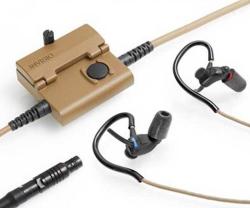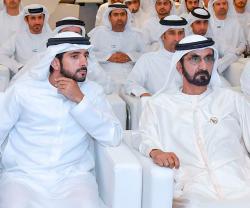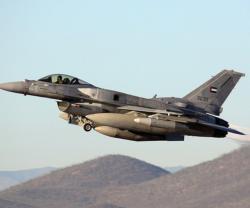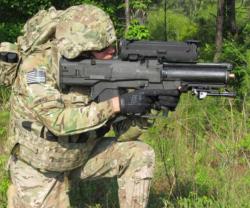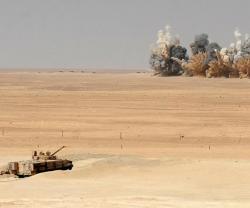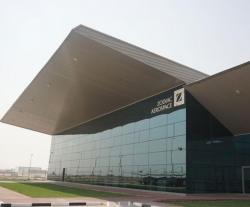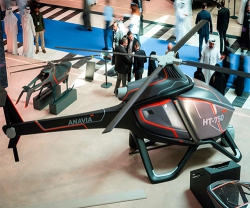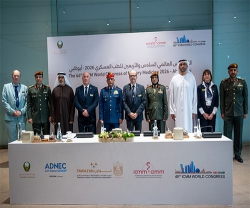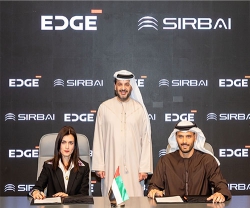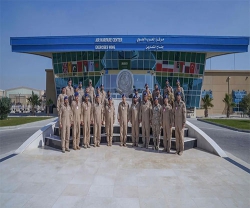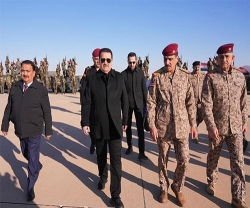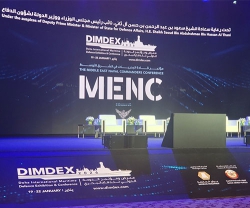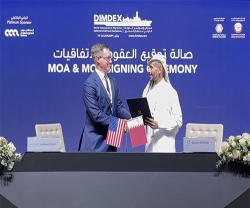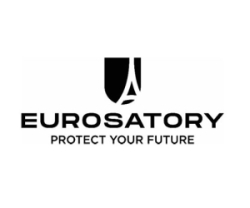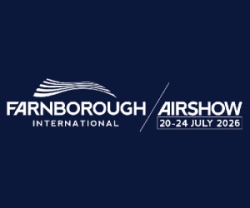New Lockheed exec sees opportunities in Emirates
23.09.2009 UAE
DUBAI, United Arab Emirates -- The former 5th Fleet commander recently tapped to head Lockheed Martin's business in the United Arab Emirates said Wednesday he sees "lots of opportunities" to work with the U.S. ally as it bulks up its defenses.
Charles "Willy" Moore gave few specifics about potential arms deals with the oil-rich nation, which lies directly across the Persian Gulf from Iran. But he did say he was confident negotiations will succeed to deploy a $7 billion missile defense system that could form part of a stronger missile shield for the region.
"Lockheed Martin ( LMT - news - people )'s footprint here is expanding, it's becoming more complex," Moore told The Associated Press over the phone from Abu Dhabi. "As we look forward, we see lots of opportunities to deepen our partnership with the United Arab Emirates."
Moore, a retired Navy vice admiral, was named the U.S. defense contractor's first chief executive for the Emirates last month. He is based in the capital, Abu Dhabi.
His appointment comes as the Obama administration shifts its focus on missile defense away from Europe and toward the Middle East, where Iran's nuclear ambitions are seen by Washington and many of its regional allies as a threat.
The move underscores the Emirates' close ties with the United States and its desire to use its oil wealth to grow its military capabilities rapidly.
Between 2004 and last year, the Emirates bought more weapons than any other country besides China and India, according to the Stockholm International Peace Research Institute. The majority of those arms came from the U.S.
Lockheed and partner Raytheon ( RTN - news - people ) Corp. of Waltham, Mass., are leading the push to strengthen the Emirates' missile defense systems.
The UAE last year placed an order worth $3.3 billion for a Patriot missile defense system designed to shoot down incoming missiles in their last stages of flight.
It is not the region's only U.S. ally to have placed such an order. Saudi Arabia, Israel and Kuwait have all bought Patriot and other missile shield systems, largely to protect against missile threats from nations such as Iran.
Abu Dhabi is also pushing to become the first country after the U.S. to deploy what Lockheed says is an even more advanced missile defense system known as the Terminal High Altitude Area Defense system, or THAAD. The system, which is still undergoing testing, is part of a planned missile defense shield for the United States.
Moore said he was hopeful the deal to sell the $7 billion system to the Emirates would be completed, though he declined to say when that might be.
"We're making good progress and everyone is satisfied with it," he said. "We're confident it's going to become operational and meet their needs."
Lockheed is also among the biggest suppliers of the UAE air force, which uses the company's F-16s as one of two main types of fighters.
Emirati F-16 pilots wrapped up air combat training exercises earlier this month with the U.S. Air Force at Nellis Air Force Base near Las Vegas. It was the first time the country's pilots had taken part in the "Red Flag" training exercises.
In February, the company agreed to sell 12 C-130J Super Hercules transport aircraft to the Gulf state.
French officials are also actively courting the UAE military. President Nicolas Sarkozy this year opened France's first military base in the Gulf outside Abu Dhabi, and is pushing for the sale of 60 Rafale fighter jets made by France's Dassault SA.
Moore said there are no formal discussions under way about additional F-16 purchases, but he noted that the company talks with UAE daily at various levels about the fighter.
"Of course we're in the business of producing F-16s," he said. "I think the UAE is very much aware that if they require more F-16s, Lockheed Martin is in a position to provide them."
Charles "Willy" Moore gave few specifics about potential arms deals with the oil-rich nation, which lies directly across the Persian Gulf from Iran. But he did say he was confident negotiations will succeed to deploy a $7 billion missile defense system that could form part of a stronger missile shield for the region.
"Lockheed Martin ( LMT - news - people )'s footprint here is expanding, it's becoming more complex," Moore told The Associated Press over the phone from Abu Dhabi. "As we look forward, we see lots of opportunities to deepen our partnership with the United Arab Emirates."
Moore, a retired Navy vice admiral, was named the U.S. defense contractor's first chief executive for the Emirates last month. He is based in the capital, Abu Dhabi.
His appointment comes as the Obama administration shifts its focus on missile defense away from Europe and toward the Middle East, where Iran's nuclear ambitions are seen by Washington and many of its regional allies as a threat.
The move underscores the Emirates' close ties with the United States and its desire to use its oil wealth to grow its military capabilities rapidly.
Between 2004 and last year, the Emirates bought more weapons than any other country besides China and India, according to the Stockholm International Peace Research Institute. The majority of those arms came from the U.S.
Lockheed and partner Raytheon ( RTN - news - people ) Corp. of Waltham, Mass., are leading the push to strengthen the Emirates' missile defense systems.
The UAE last year placed an order worth $3.3 billion for a Patriot missile defense system designed to shoot down incoming missiles in their last stages of flight.
It is not the region's only U.S. ally to have placed such an order. Saudi Arabia, Israel and Kuwait have all bought Patriot and other missile shield systems, largely to protect against missile threats from nations such as Iran.
Abu Dhabi is also pushing to become the first country after the U.S. to deploy what Lockheed says is an even more advanced missile defense system known as the Terminal High Altitude Area Defense system, or THAAD. The system, which is still undergoing testing, is part of a planned missile defense shield for the United States.
Moore said he was hopeful the deal to sell the $7 billion system to the Emirates would be completed, though he declined to say when that might be.
"We're making good progress and everyone is satisfied with it," he said. "We're confident it's going to become operational and meet their needs."
Lockheed is also among the biggest suppliers of the UAE air force, which uses the company's F-16s as one of two main types of fighters.
Emirati F-16 pilots wrapped up air combat training exercises earlier this month with the U.S. Air Force at Nellis Air Force Base near Las Vegas. It was the first time the country's pilots had taken part in the "Red Flag" training exercises.
In February, the company agreed to sell 12 C-130J Super Hercules transport aircraft to the Gulf state.
French officials are also actively courting the UAE military. President Nicolas Sarkozy this year opened France's first military base in the Gulf outside Abu Dhabi, and is pushing for the sale of 60 Rafale fighter jets made by France's Dassault SA.
Moore said there are no formal discussions under way about additional F-16 purchases, but he noted that the company talks with UAE daily at various levels about the fighter.
"Of course we're in the business of producing F-16s," he said. "I think the UAE is very much aware that if they require more F-16s, Lockheed Martin is in a position to provide them."
Previous PostUAE aircraft demand still strong
Latest news
Latest events
World Defense Show (WDS) 2026
08 - 12 Feb 2026Riyadh - Saudi ArabiaSAHA EXPO International Defence & Aerospace Exhibition
05 - 09 May 2026İstanbul Expo Center - TurkeyEUROSATORY 2026
15 - 19 Jun 2026Paris Nord, Villepinte - FranceFarnborough International Airshow
20 - 24 Jul 2026Farnborough - United Kingdom


